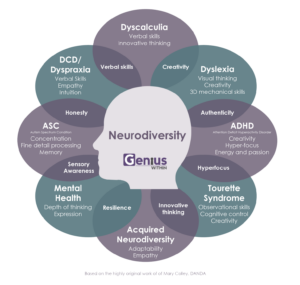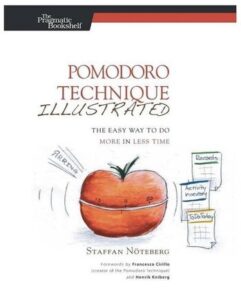Perspectives from Black/Brown Students Navigating the Academic and Social-emotional Challenges of College*

Diagram explaining neurodiversity based on the work of Mary Colley (DANDA)
The term neurodiversity is often attributed to Judy Singer, an Australian sociologist, who first tried to map and name an unknown disability in her thesis in 1998. However, a recent article claims that the concept of neurodiversity was developed collectively, with credits due to the online community of autistic people.
According to a popular working definition published in the Harvard Health blog, neurodiversity “describes the idea that people experience and interact with the world around them in many different ways; there is no one ‘right’ way of thinking, learning, and behaving, and differences are not viewed as deficits.” Neurodivergent (sometimes abbreviated as ND) describes a mind or brain that functions differently than what society deems “normal” or “typical.” But what exactly is “normal,” anyway? What is accepted as normal, when everyone has their own way of thinking, feeling, and navigating this crazy world? And how does this sense of normalcy or abnormalcy work for Black and Brown neurodivergent students who have to navigate their college experiences?
Panelists
On Tuesday, October 8, for Disability Awareness Month, I attended the panel discussion Neurodiversity on Campus: Perspectives from Black/Brown students navigating the academic and social-emotional challenges of college, organized by Bret McCandless, music and performing arts librarian at the New Brunswick Libraries.
The panelists consisted of Black and Brown students who shared their experiences of academia while being neurodivergent. The panelists were Kevin (junior), Danielle (undecided student), Arielle (who is graduating from the School of Communication and Information’s Master of Communication and Media degree, with a concentration in Digital Media), Ayanna Towers, Psy.D. and Keith Murphy, LPC, LCADC.
Discussion
The conversation dove into many different topics, such as what affirmed the panelists’ neurodiversities, areas of growth in the program, and how students and faculty who are neurodivergent can access these important services. Arielle stated how she was “really grateful to make it to her 30s,” given that the statistics are high for neurodivergent people to have anxiety, depression, or other mental health issues. She also stated, “I just don’t have the patience for the unnecessary” and noted how important it is for people to have grace with themselves.
 Danielle praised the level of care given by people at the Mason Gross School of the Arts regarding what students need. She also suggested taking frequent breaks and using the Pomodoro study method, where 50 minutes of work is done, followed by a 10-minute break. There is also an alternative method where you do 25 minutes of work followed by a 5-minute break that’s also effective. I also personally use the Pomodoro method for my busy study days, when I’m overwhelmed with the projects, tests, and papers I have to do for the week. The Pomodoro technique allows me to break down long work days into small chunks that are easy to manage. The short breaks in between help me calm my mind down and relax so I can go back to work.
Danielle praised the level of care given by people at the Mason Gross School of the Arts regarding what students need. She also suggested taking frequent breaks and using the Pomodoro study method, where 50 minutes of work is done, followed by a 10-minute break. There is also an alternative method where you do 25 minutes of work followed by a 5-minute break that’s also effective. I also personally use the Pomodoro method for my busy study days, when I’m overwhelmed with the projects, tests, and papers I have to do for the week. The Pomodoro technique allows me to break down long work days into small chunks that are easy to manage. The short breaks in between help me calm my mind down and relax so I can go back to work.
Keith added his experiences growing up undiagnosed with ADHD in his childhood, from constantly being forgetful, thinking he was dumb, and daydreaming in classes. However, he was always fascinated with reading, and he used his love for reading to his advantage. “I’m a sprinter or grazer,” he said. “When the energy is there, it’s there. And when it’s not, it’s not. It’s like taking a bath. You don’t want to, but when you’re in it, you feel good.”
The discussion transitioned to reflect what affirmed everyone’s neurodiversity. Keith mentioned going to social anxiety and group therapy classes, adding: “they brought people who were similar together.”
Arielle spoke highly of the Graduate Student Lounge, which is part of the College Avenue Student Center at 126 College Avenue. The Lounge has two offices: the Office of Graduate Student Life, the Division of Student Affairs, and the Rutgers University Graduate Student Association. The Lounge space includes comfortable amenities like couches to relax and study, a microwave, a refrigerator, and a Keurig. It is also available spaces for meetings and events that student organizations can reserve. “We need more buildings that accommodate us better like that!” she exclaimed.
Areas of growth within their graduate programs were another important discussion topic for the group. Kevin stated how his communication improved once he joined a club. “At first, I was nervous and anxious. I thought I didn’t belong. But later, I felt that I could connect with them,” he replied. Meanwhile, Danielle struggled during the pandemic. She finally gathered the courage to join a club this year and started a job, which improved her time management. She also suggested the Structured app for class organization. For further information, here’s an article about apps for post-secondary students with ADHD.
The panel also talked about how important it is for people to know about these services. Kevin mentioned the importance of sticking posters on bulletin boards where they are more than likely to be noticed. Danielle also suggested that organizations have a list of resources during what is known as Syllabus Week, the first week of the new semester, where professors go over their plans for the semester with the class. Posters during orientation are also helpfulto help get the word around about services and events at the beginning of the school year.
Closing Comments
This panel event was a great way to get inside the mindset of Black and Brown neurodivergent students at Rutgers. Check out the calendar of events hosted by Rutgers University Libraries.
Readings from the Rutgers Collection
- Neurodiversity and Neurodivergence: Terms to Know. (2024). In Montessori life (Vol. 36, Number 3, pp. 17–17). American Montessori Society.
- Nöteberg, S., & Cirillo, F. (2009). Pomodoro Technique illustrated: the easy way to do more in less time (1st edition). The Pragmatic Bookself.
- Torres P. (2021). My Beef with the Pomodoro Technique. Uloop.
- Hines S. (2010). Productivity for Librarians : How to Get More Done in Less Time. 1st edition. Chandos Publishing.
- Udonsi P. (2022). Young, gifted and black: the intersectionality of race, intellectual disability and neurodivergence. Critical and radical social work. 10(2):226-241.
- Payne A. (2024). Breaking Grounds: Utilizing My Black American Resilience to Reflect on Realities as a Black, Multiracial, Queer, and Neurodivergent Therapist – A Feminist Autoethnography. ProQuest Dissertations & Theses.
*Editor’s note
In October, the libraries hosted the following four events, partnering with departments, centers, schools, and services at Rutgers to celebrate Diversity Awareness Month.
- Neurodiversity on Campus: Perspectives from Black/Brown students navigating the academic and social-emotional challenges of college, October 8th, 12:30pm – 1:45pm, Alexander Library Teleconference Lecture Hall (will not be streamed due to sensitivity of topic)
- Empowering People: Disability Rights, Power, and Lived Experience, October 8th, 2:30pm – 4:00pm, Alexander Library Teleconference Lecture Hall (and via Zoom)
- Empowering Lives: The Role of Service Dogs in Creating Independence for People with Disabilities, October 15th, 10:30am – 12:00pm, Alexander Library Teleconference Lecture Hall (and via Zoom)
- Guiding Independence: Understanding the Role of Seeing Eye Dogs, October 15th, 12:00pm – 1:30pm, Alexander Library Teleconference Lecture Hall (and via Zoom)